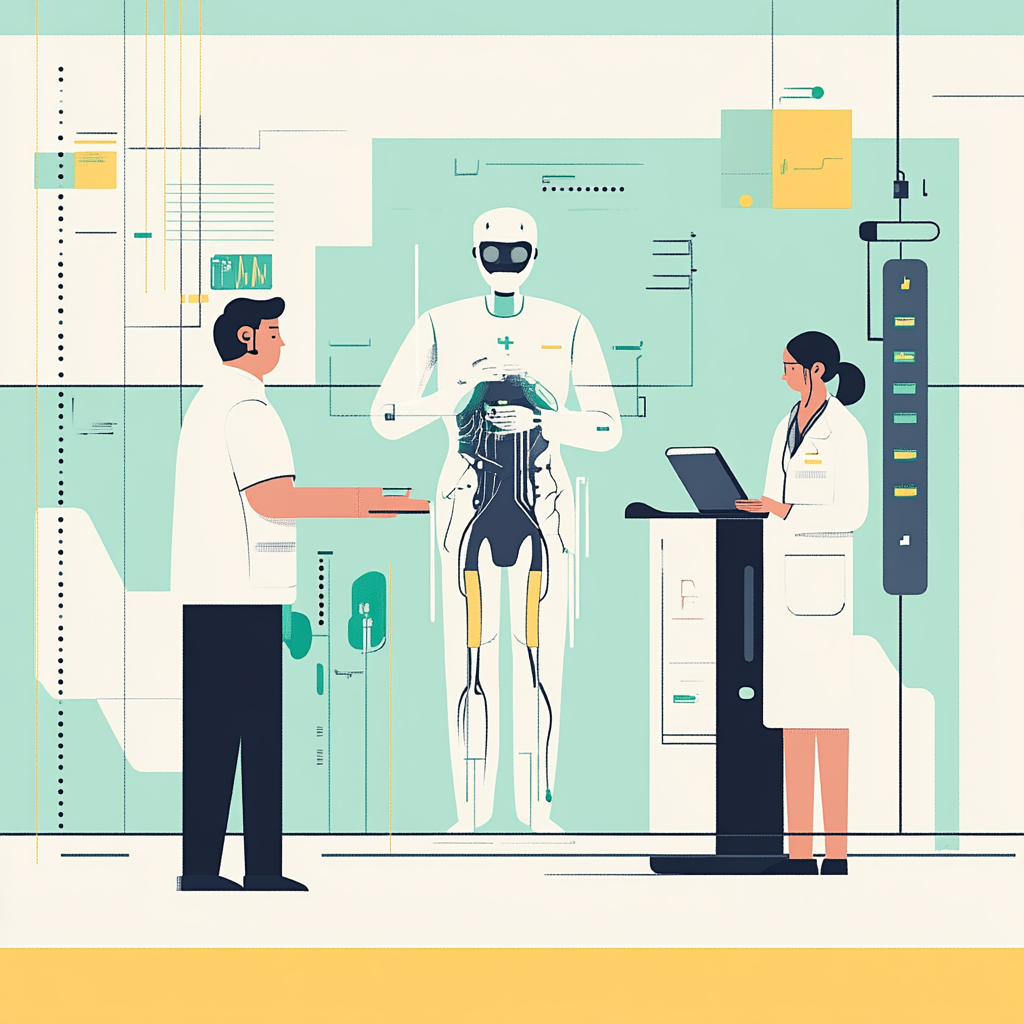Top Healthcare Futurist Speakers Reveal: 5 AI Trends Shaping the Future of Healthcare
The healthcare industry is undergoing a major transformation driven by rapid artificial intelligence (AI) advancements. Healthcare futurist speakers are leading the way and shaping patient care in the future. In this article, we will look at five new AI trends that will change healthcare, according to experts in the field.
Generated by Midjourney
1. Generative Health: AI-Powered Personalized Health Coaching
Dr. Daniel Kraft, a renowned physician-scientist and healthcare innovator, introduces us to the concept of "Generative Health." This groundbreaking approach uses AI to create highly personalized health coaches that adapt to individual needs and preferences.
"Imagine an AI health coach that syncs with your calendar, recognizing you're on a cross-country flight and adjusting recommendations accordingly, even factoring in jet lag," Dr. Kraft explains. This personalized health tracking goes beyond tracking one data point. It's a holistic approach that uses different sources to give a complete picture of your health.
Current applications of Generative Health are already emerging, with platforms like ŌURA and WHOOP creating early versions of this technology. As these systems evolve, they promise to revolutionize preventive care, early diagnosis, and chronic disease management, potentially leading to significant cost reductions in healthcare.
There are many potential benefits of Generative Health:
Personalized health recommendations based on real-time data
Early detection of health issues before they become serious
Improved management of chronic conditions
Increased patient engagement in their own health
However, challenges remain, such as ensuring data privacy and integrating these AI systems with existing healthcare infrastructure.
2. The Future of Surgical 3D Printing and AI Integration
Dr. Shafi Ahmed, a pioneer in digital health, sheds light on the potential of 3D printing in surgery when combined with AI. This technology is impacting surgical practices in several key areas:
Pre-surgical Planning: AI-enhanced 3D-printed models allow surgeons to visualize and practice complex procedures before entering the operating room. This can lead to:
Reduced surgical errors
Shorter operation times Improved patient outcomes
Custom Implants and Prosthetics: AI algorithms can design patient-specific implants, improving fit, comfort, and recovery times. Benefits include:
Better integration with the patient's body
Reduced risk of complications
Faster rehabilitation
Bioprinting: The creation of tissues and organs using a patient's own cells, with AI optimizing the printing process. This could potentially:
Reduce organ transplant waiting lists
Minimize the risk of organ rejection
Enable personalized drug testing on printed tissues
"The synergy between AI and 3D printing in surgery is opening up possibilities we could only dream of a decade ago," Dr. Ahmed notes. "It's not just about creating better tools; it's about reimagining the entire surgical process."
3. Responsible AI Integration in Patient Care
Generated by Midjourney
Dr. Harvey Castro, an emergency physician and AI expert, emphasizes the importance of responsible AI adoption in healthcare. His insights focus on:
AI as a Complementary Tool: "AI should enhance, not replace, the doctor-patient relationship," Dr. Castro stresses.
This means:
Using AI to support clinical decision-making
Freeing up doctors' time for more meaningful patient interactions
Improving the accuracy of diagnoses and treatment plans
Patient Empowerment: Using AI for non-urgent medical questions, with a structured process for verifying AI-generated information with healthcare professionals.
This can lead to:
Increased health literacy among patients
Reduced burden on healthcare systems for minor issues
Better-informed discussions between patients and doctors
Safety Protocols: Implementing clear guidelines for AI use in healthcare settings to address challenges like the "hallucination effect" in AI responses.
This involves:
Regular auditing of AI systems for accuracy
Clear communication to patients about the limitations of AI
Establishing a chain of responsibility for AI-assisted decisions
Dr. Castro's vision for the future includes improved patient education and engagement through AI tools, always balanced with professional medical oversight.
4. Virtual Reality (VR) as a Transformative Tool in Healthcare
Dr. Rafael Grossmann with XR glasses.
Dr. Rafael Grossmann, a surgeon and digital health innovator, highlights the game-changing potential of VR in healthcare:
Pain Management: VR creates immersive, calming environments for patients undergoing complex procedures or managing chronic pain.
This can result in:
Reduced need for pain medication
Improved patient experiences during medical procedures
Better management of long-term pain conditions
Rehabilitation and Therapy: Interactive VR environments offer tailored exercises for physical and cognitive rehabilitation.
Benefits include:
More engaging and effective therapy sessions
The ability to track progress precisely
Customizable difficulty levels to suit each patient's needs
Medical Training: VR simulations provide risk-free, realistic training scenarios for healthcare professionals.
This leads to:
More experienced practitioners without risking patient safety
The ability to practice rare or complex procedures repeatedly
Improved teamwork and communication in medical settings
"VR is not just a novelty," Dr. Grossmann asserts. "It's a powerful ally in our pursuit of better healthcare outcomes, from improved patient experiences to enhanced medical education."
5. The Digital-First Revolution in Healthcare Delivery
Lucien Engelen, a healthcare innovation expert, outlines the shift towards a digital-first, physical-next approach in healthcare delivery:
Delocalization of Healthcare: Engelen predicts that within seven years, 70% of routine medical measures will move out of hospital premises.
This shift could lead to:
More convenient access to healthcare for patients
Reduced burden on hospital resources
Improved monitoring of chronic conditions
Everyday Technology in Healthcare: Consumer devices like smart earbuds and wearables are becoming integral to health monitoring.
This trend promises:
- Continuous health data collection for early problem detection
- Increased patient engagement in their own health
- More accurate and timely health interventions
Data-Driven Predictive Healthcare: Healthcare professionals will increasingly subscribe to patient data, potentially preventing health crises before they occur.
This approach could:
- Reduce emergency hospital admissions
- Improve overall population health
- Lower healthcare costs through prevention
"We're witnessing a transition from academic to subclinical to supermarket healthcare," Engelen explains. "The challenge now is to create a 'digital front door' for patients while balancing this approach with traditional care for those who need it."
The Impact on Healthcare Professionals
As these AI trends reshape healthcare, the roles of healthcare professionals will evolve:
Doctors will need to become adept at interpreting AI-generated insights and integrating them into patient care.
Nurses may take on more specialized roles in managing and interpreting health data.
New positions, such as AI healthcare coordinators, may emerge to bridge the gap between technology and patient care.
Continuous learning and adaptation will be crucial for healthcare professionals to thrive in this AI-enhanced environment.
Ethical Considerations
The integration of AI in healthcare also raises important ethical questions:
How do we ensure patient privacy with increased data collection and sharing?
What are the implications of AI making or influencing medical decisions?
How can we prevent bias in AI systems and ensure equitable access to AI-enhanced healthcare?
Addressing these ethical concerns will be crucial for the responsible development and implementation of AI in healthcare.
Conclusion
As these healthcare futurist speakers demonstrate, AI is set to revolutionize every aspect of healthcare, from personalized health coaching to surgical procedures and healthcare delivery models. By embracing these innovations responsibly, the healthcare industry can improve patient outcomes, reduce costs, and create a more efficient and accessible system for all.
The future of healthcare is here, and it's being shaped by AI. As patients and healthcare professionals alike, it's crucial to stay informed about these developments and advocate for their responsible implementation. The insights provided by these expert speakers offer a roadmap for navigating the exciting and transformative journey ahead in healthcare.
Speak About AI: Bringing Cutting-Edge Insights to Your Organization
If you're interested in learning more about these exciting healthcare trends, consider booking a healthcare speaker or healthcare futurist through Speak About AI. Our keynote speakers, like Dr. Daniel Kraft, can provide cutting-edge insights on patient care and leave a lasting impact on your audience. Through our roster, we can connect you with top healthcare futurists who are shaping the future of medicine and technology. Their expertise can inspire and educate, helping your organization stay ahead in the rapidly evolving world of healthcare.
By bringing these visionary thinkers to your events, you can ensure that your team is well-prepared for the AI-driven future of healthcare. Whether you're a healthcare provider, a technology company, or a policy-making organization, the insights from these healthcare futurist speakers can help guide your strategy and decision-making in this exciting new era of medicine.



